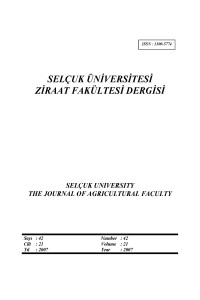Abstract
To control the Fusarium crown and root rot by nonpathogen Fusarium spp., 40 diversity isolates of nonpathogen Fusari-um spp., from roots of various plants belonging Gramineae and healthy tomato were tested as pot experiment. Pot soil was artificially infested with pathogen fungi grown on perlite-bran medium at 1/19 (v/v). Two days after inoculum, tomato seedlings were planted in infested pot soil by dipping the plant roots at transplant in a conidial suspension (108 cfu/ml). After ten weeks using 0-4 scale, isolates D18, G39, G5, D8, D23 and D25 of tested nonpathogen fungi significantly controlled the disease compared to others. Of tested isolates, D8, G5, G39 and D18 controlled the disease by 34.6%, 46.4%, 64.2% and 69.6%, respectively. The results showed that, antagonists isolated from different host would be used as biocontrol agents in disease control in tomato. Because of there was no effective antagonistic effect in dual culture, it was suggested that, mode of action of nonpathogen Fusarium spp. tested would be attributed to induced systemic resistance and competition.
Patojen Olmayan Fusarium Türleri İle Domateste Fusarium Kök Çürüklüğü Hastalığının Biyolojik Kontrolü Üzerinde Bir Araştırma
Abstract
Domateste Fusarium kök boğazı ve kök çürüklüğü hastalığını patojen olmayan Fusarium türleri ile kontrol etmek amacıyla farklı Gramineae türleri ve domates bitkilerinin rizosferlerinden izole edilen 40 farklı patojen olmayan Fusarium izolatları saksı denemesi şeklinde test edilmiştir. Perlit-kepek ortamında yetiştirilen patojen saksı toprağına 1/19 oranında bulaştırılmış-tır. İnokulasyondan iki gün sonra domates fidelerinin kökleri her bir antagonistin spor solüsyonu içine (yaklaşık 108 cfu/ml) daldırılarak bulaşık saksı toprağına dikilmiştir. 10 hafta sonra 0-4 skalası kullanılarak yapılan değerlendirmede D18, G39, G5, D8, D23, D25 ve D38 izolatları hastalığı diğerlerine göre daha iyi kontrol etmiştir. Test edilen izolatlardan D8, G5, G39 ve D18 hastalığı sırasıyla %34.6, 46.4, 64.2 ve 69.6 oranında kontrol altına almıştır. Elde edilen sonuçlara göre farklı konuk-çulardan izole edilen antagonistlerin domateste biyokontrol ajanı olarak kullanılabileceğini göstermektedir. In vitro koşulların-da test edilen ajanlar patojene karşı etkin antagonistik etki göstermemiş olması nedeniyle etki mekanizmasının konukçu daya-nıklılığının uyarılması ve rekabetten kaynaklanabileceği düşünülmüştür.
Details
| Primary Language | English |
|---|---|
| Subjects | Botany |
| Journal Section | Research Article |
| Authors | |
| Publication Date | August 25, 2007 |
| Submission Date | January 1, 2007 |
| Published in Issue | Year 2007 Volume: 21 Issue: 42 |
Selcuk Agricultural and Food Sciences is licensed under a Creative Commons Attribution-NonCommercial 4.0 International License (CC BY NC).


